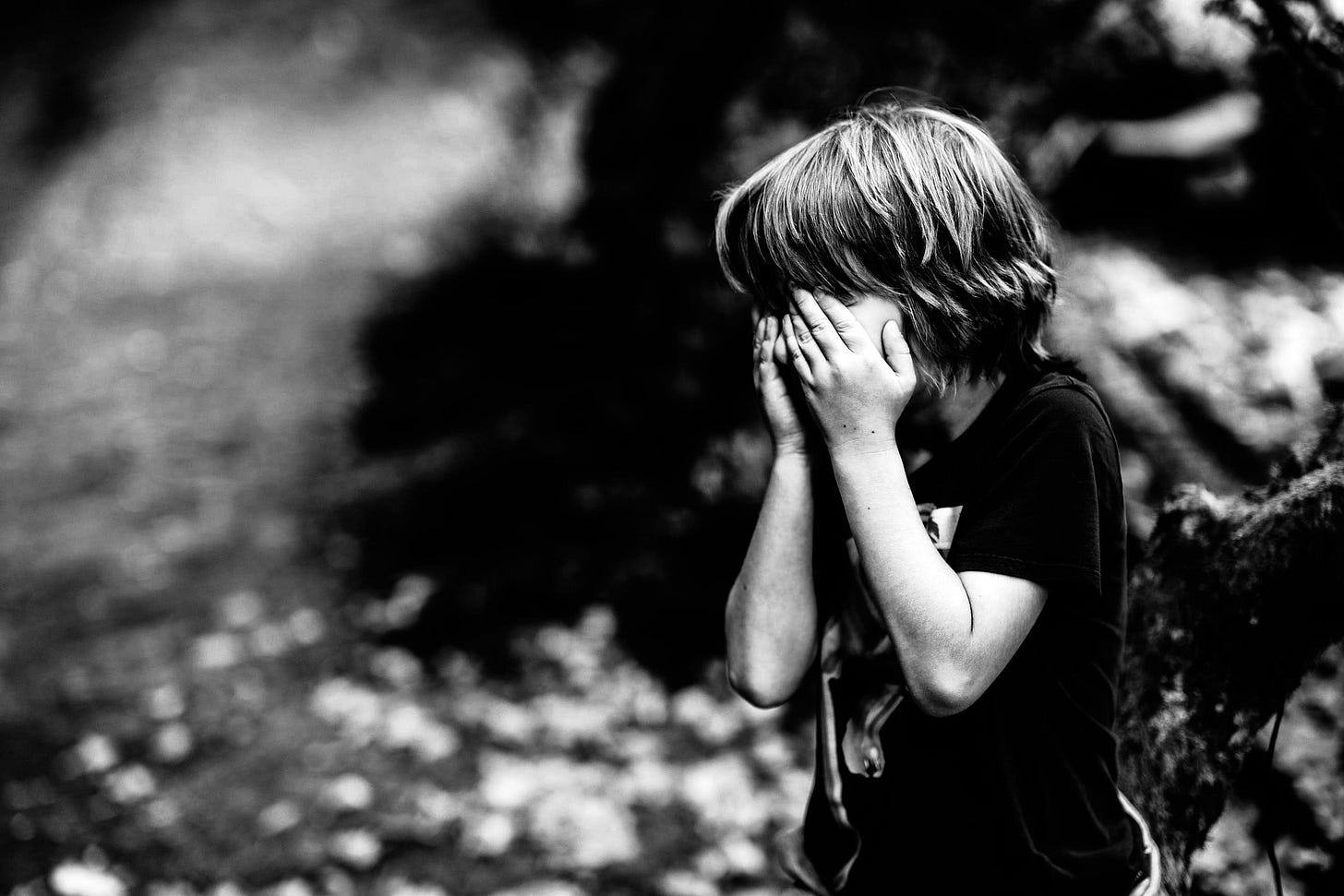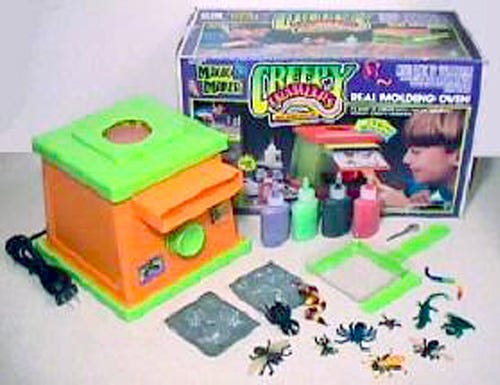Pouring Boiling Water Over Children
Redemption in the arms of madness on a cold winter day

It was cold outside. My best friend’s younger brother was sitting on the front step outside his home across the street, wearing a grey denim button-down shirt and blue jeans. A few snowflakes danced in the wind while he sat with his arms wrapped around his chest. Puffs of cold vapor pushed rapidly out his pursed lips like he had been running.
I found that odd. But then, Brett was a little odd, so I didn’t pay much attention. I was a ten-year-old boy with bigger things on my mind, like Major Matt Mason’s next mission.
Innocence. That’s what a ten-year-old boy’s life should be all about, right? My thoughts were about the major’s current mission, defending against an invasion of giant spiders and bugs that had sprung from Creepy Crawler molds baked in my Thingmaker machine.

Life was good. Or, so I thought at the time.
Brett was about seven. He often followed his older brother around while we played “Kick the Can” and “Red Rover” with our neighborhood friends. Brett would occasionally run away sobbing because his brother, my friend, would call him names or berate him over an imagined offense.
After all, Brett wasn’t supposed to be there, right? Those were the unwritten rules of ten-year-old boyhood. At least in our neighborhood. No seven-year-old brothers within the territory.
It was a rule enforced not by fist, but by ridicule, and, sadly, my friend, who often treated his younger brother with tremendous affection when they weren’t in a crowd of other kids, was a master of his craft.
After a brief battle, which the great Major Matt Mason won handily despite horrific odds, I looked up from the battlefield on the couch to peer out the picture window of the den I was playing in.
Brett was still outside on the step, still pushing the cold vapor into the air with his mouth, maybe shivering a bit. Curiosity began to tickle the nerves in the back of my head, but I sensed another imminent attack from rubbery crawly things.
Priorities.
I looked upon the couch, and sure enough, one of the larger Creepy Crawlers was coming back to life. Worse, there were now reinforcements: Small army men, nationality unknown, were swarming Major Matt Mason’s lunar outpost. The situation was critical.
But first, one more look outside.
I peered out the window again, noticing Brett’s grandmother holding a huge metal steaming pot in her hands while she stood behind him in the open doorway. She was holding the kettle with potholders.
Such a strange thing.
I was ten. I was unable to piece together what this might be about. In all honesty, who could?
Who could guess that this little old lady, even though she was cantankerous on her best days, would pour the boiling contents of the kettle over Glen’s head while he sat shivering on the stoop?
What is a ten-year-old boy to make of watching the steam rise from his young neighbor’s blond head, and then watching the screaming child jump up and bolt past his grandmother into the house, the grandmother holding the empty kettle in the frigid air, more steam pouring out of the empty vessel like a monstrously thick smoking gun?
The grandmother calmly turned around. The door slammed behind her.
Major Matt Mason was reduced to a tender piece of useless plastic and rubber. He lay on the battlefield of the couch on his back, staring straight into space, as if he, too, had been paralyzed by an impossible state of madness and terror.
There was nobody home. I didn’t know what to do, or even think. I had never seen such a thing. All I could think was that it wasn’t real, that my mind had transported the major’s terror to the house across the street to form a new battlefield of incomprehension.
The major continued to lie helplessly on the couch as if transfixed by the impossibility of his sudden emasculation. There was nothing he could do. There was nothing I could do.
A bond formed. I picked the major up with my right hand, and cried.
One day, a few weeks later, my friend Mark asked me why I was suddenly inviting Brett along for all our neighborhood adventures and activities.
We were walking in the forest preserve to our secret pond, the one nobody else knew about, the one where I had acquired a water snake that taught me that a viper has a little hole in its head, which would have made it a water moccasin and so, no, this was just a water snake. Same coloring. But not dangerous. Not a viper.
I had taken the water snake home and terrorized my mother by placing it into an empty garbage can, with a little water and a rock, so that the snake could roam in the water and sit on the rock when it was tired.
That pond. It was the pond where we captured tadpoles and stored them in jars on my parents’ patio. It was the pond where we found a box turtle and gave it a new home in a small box, also on my parents’ patio.
Frogs often found a new home on the patio, too. One day, small water rats also discovered the joys of living in patio surroundings. My parents had unexpectedly become local zookeepers, with nary a complaint.
Brett tagged along behind us as Mark asked me again. “Huh? Why?” Brett was nearly skipping as we strode through the thick forest on a deer trail only we knew. He was happy.
All I could think of as an answer was, “Come on, he’s getting older.”
My smart friend said, “He’ll always be three years younger than me.”
I didn’t want to say that I saw their grandmother pour boiling water over his head. I didn’t want to tell him that I wanted to look for scars underneath his thick blond hair. I didn’t want to talk about it at all.
I started looking out my home’s picture window with increased frequency. I noticed that Mark’s mother and father fought a lot. Mark and I were best friends, but he never once let me into his home. I never understood why, but I was ten. I didn’t much care.
Mark’s mother was a big woman. Bigger than my dad, bigger than most of the dads in the neighborhood. His father was even bigger. Mark was heading in that direction, too.
Sometimes I would see silhouettes within their screened porch pushing and shoving. One time, I thought I saw one of the silhouettes bounce off one side of the screened porch and fall to the ground.
Male or female? I couldn’t tell. It seemed far away, not across the street at all, like the edge of a nightmare that I couldn’t parse.
Over time, their porch became like a sinister black-and-white 1960s television show. “Leave it to Beaver,” but with a dark side, viewable only through a brown meshed screen that added mystery and doom that only I was privy to. Whatever was happening was not truly discernible. It’s amazing how small doses of information can impact our memories forever.
My parents weren’t much help. Part of the reason they were willing zookeepers was because they were rarely around. My father was usually with his other woman, and my mother was often behind a closed door of her bedroom, her brain stunted by megadoses of Valium and Librium and Darvon.
Mark’s house was surrounded by a chain link fence. Outside their screened porch was a sideyard with a billowing, fat willow tree.
Whenever I looked outside from one of my many fields of battle, I would pay extra attention when I saw Mark’s mother in the side yard. She fascinated me with her always-on scowl. A permanent fixture. It was a scowl I could see if I was up close or far away.
One day, she was standing in the side yard with my friend Mark. They seemed to be talking. No big deal. They weren’t arguing. She seemed to be explaining something. Her right hand raised and then slapped against her side, but it didn’t seem like anything special.
Then, out of nowhere, like a boxer, she delivered a solid roundhouse to Mark that sent him quickly crumpling to the ground.
I was only ten. But I was finally understanding that something was terribly wrong.
Near the end of that winter, Mark, Brett, and I went snow sledding on Suicide Hill with some neighborhood kids in the same forest preserve as the pond with the water snake and frogs and box turtles.
Suicide Hill was our name for it. You wouldn’t have found it on any maps. It was a tall hill in the forest with a winding trail that only skilled sledders, in our opinion, should attempt to navigate.
Everyone took their turns. I was the last to go. I took off my gloves and rubbed my hands together confidently, then put the gloves back on. I was scared as shit. But I had done this before. I knew I could do it. I would beat Suicide Hill.
I got onto my sled, adjusted its front arms a bit, pushed my hands against the ground at my sides, and away I went, head first. The sled curled around one curve, then another, gaining speed, thrilling my chest, my courage building like someone was pouring it into me from above.
I approached the last curve, determined to round it with such speed that Veronica, my current crush, would have to cheer when I reached the bottom of the hill. She would smile at me, I knew, like she did when I made a presentation during Show and Tell in school. It would be fabulous.
I spied the end of the route as the curve approached. It was a tough curve because there was a tree in the middle of it, and you had to veer off to the left to avoid the tree. But if you veered too far, you’d end up in scrub and a nasty slope to the left full of other trees.
This required the kind of expertise that only the great sledders of the area should attempt. I pushed my sled arms just a tad to adjust for the curve, and the tree, and.. BAM! Head meets tree.
When I came to, I was being carried in the arms of Mark’s huge father. I felt like I was about one-tenth his size as he trudged through the woods. I was actually a little afraid he’d kill me. So that was weird.
He took me home, set me down on my front lawn, patted my shoulder with a hand that was the size of something that belonged to one of the huge beasts that surely walked the forest preserve at night, and said, “You’ll get it next time.”
NOTES
Although the events of this story are real, the names were changed. I don’t know what became of the real “Brett,” but it was a tough neighborhood, filled with survivors.
This story first appeared in the Medium publication, Ellemeno, in October 2023.
Thanks for reading!



I remember sledding now in South Park in Quincy, Illinois. Good cold fun.
The child abuse? I lived it. Not hot boiling water, but plenty of slapping around by my angry, lunatic father. 🙄
Really well written....made me feel.
I was so caught up in the story that I forgot to mention that it is very well written. So much horror to take in.
I'm still processing this:
"I didn’t want to say that I saw their grandmother pour boiling water over his head. I didn’t want to tell him that I wanted to look for scars underneath his thick blond hair. I didn’t want to talk about it at all."